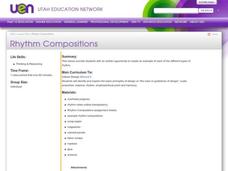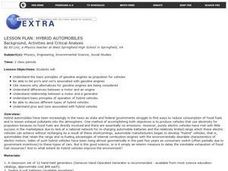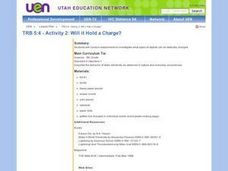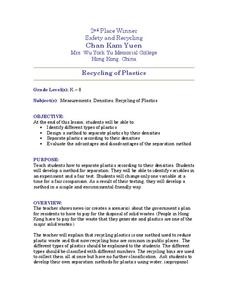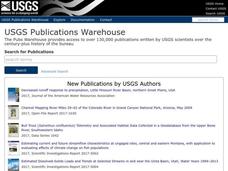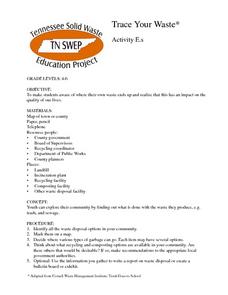Curated OER
Rhythm Compositions
Students investigate the concepts that focuses upon the musical rhythms. They conduct class discussion and use questions in order to clear up any misconceptions. Students create art compositions that illustrate rhythm and then each one...
Curated OER
We the Present
Young scholars interview representatives from nonprofit organizations in their community. They summarize the information from their interviews and share the information with the class. They identify the impact of the organization on the...
Curated OER
Hybrid Automobiles
Students explain the basic principles of gasoline engines as propulsion for vehicles. They cite reasons why alternatives for gasoline engines are being considered and explain differences between a motor and an engine.
Curated OER
Galloping Gertie
Students read a poem and are to write another poem using the words given. They are also to develop a monument and narrative of the bridge and its collapse.
Curated OER
Diet: Cereal Grains and Nutrition
Students identify the nutritional value of various cereal grains. Without adding sugar, they cook with grains and compare the taste to cereal containing sugar. In addition, students complete worksheets about the different grains,...
Curated OER
French Revolution v. Russian Revolution
In this French Revolution and Russian Revolution study guide worksheet, learners examine facts about the two wars and respond to questions regarding similarities between the revolutions.
Curated OER
Will it Hold A Charge?
Fifth graders discuss which materials they believe hold an electric charge. In groups, they experiment with different objects and charging them. They discuss their results after the activity.
Curated OER
TE Activity: Write On!
Students write a book, newspaper, or other chose published writing that explains the connection between engineering and the environment. They determine why engineers need to be good communicators.
Curated OER
Class Penny Quilt
Students explore penny quilts made in the late 1700s through the early 1800s. They identify significant events from their lives and create their own class penny quilt displaying this information.
Curated OER
Recycling of Plastics
Students separate plastics according to their densities, develop a method for separation and identify variables in an experiment and a fair test, changing only one variable at a time for a fair comparison. After testing, they develop a...
Curated OER
Destructive/Constructive Communication
Students are introduced to the characteristics of destructive and constructive communication. In groups, they send I-messages to other groups of examples of each. To end the lesson, they participate in role-play activities to practice...
Curated OER
Fats
Students are introduced to the characteristics of fats and their function in the body. In groups, they make a reduced fat recipe of chicken fingers and discuss other ways to reduce fat in their diet. To end the lesson plan, they...
Curated OER
What's Going to Happen at Any Given Barometer Reading?
Fourth graders brainstorm a list of words associated with weather. In groups, they sort the words into categories and observe the weather in their area for a month. To end the lesson, they compare the barometer measurements for a...
Curated OER
What do Maps Show?
Seventh graders practice reading maps. In this geography lesson, 7th graders compare a topographical map to a picture of the actual place.
Curated OER
Food Matters
Fifth graders identify physical and chemical changes. In this science inquiry instructional activity, 5th graders observe the changes that occur when making bread and butter. Students explain if the product is result of a physical or...
Curated OER
Candy Quakes
Eighth graders use candy to show the effects of deformation forces on the earth's crust. In this rock and fossil formation lesson students construct models and simulations to describe and explain natural phenomena.
Curated OER
Coral Reefs Endangered
Students research where in the world coral reefs are located. In this ecology lesson, students create food chains and food web. They simulate growing coral reefs to understand their characteristics better.
Curated OER
World War II History Textbooks Project
Pupils, in groups, research and compare how events of World War II are treated in various countries' school textbooks through linking with another classroom from that country.
Curated OER
Trace Your Waste*
Students examine waste disposal programs in the area and record the information on a map along with ideas on where garbage should go.
Curated OER
Democracy Then and Now
Students research more about the Canadian parliamentary democratic system.
Curated OER
The Commission of Inquiry
Students explore the role and functions of a commission of inquiry and participate in a democratic debate.
Curated OER
Petroleum Poisons
Students discover how harmful petroleum distillates are that are found in the home. They demonstrate how to collect information about consumer products. They also ask their parents about the safety of the cleaning supplies used in their...
Curated OER
Store Wars: When Wal-Mart Comes to Town
Students watch video clips about the effects of Wal-Mart coming to towns. They develop a cost-benefit analysis related to the proposed store. They write their mayor listing their recommendation for the new store.
Curated OER
Realism In Chinese Art
Students examine the artistic terms realism and idealism through the study of Chinese art and artifacts in this lesson for the Social Studies classroom. Evaluation is accomplished through an in-class essay.
Other popular searches
- Types of Government
- 3 Types of Government
- Three Types of Government
- Five Types of Government
- Types of Government Diagram
- World Types of Government
- Government Types Lesson Plans
- World Government Types
- Types of Government Systems
- Different Types of Government
- Compare Government Types
- Different Government Types


